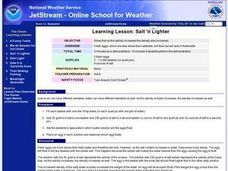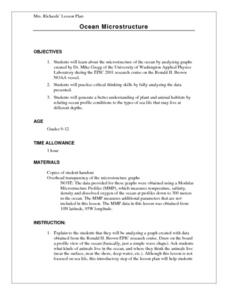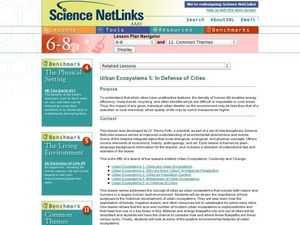Curated OER
Marine Debris on the Chesapeake Bay
Students use website to study estuarine debris data. They study the density of marine debris.
Curated OER
Density Stratification and Ocean Circulation
Students examine how circulation currents of the ocean. They use a tub of hot and cold water to demonstrate the currents. They discover how salinity and temperature of water affect its movement.
Curated OER
New Jersey Estuaries
Students experiment to discover that salt water is denser than fresh water by creating color coded solutions. They examine how heavy rainstorms and high tides develop layers of different degrees of density.
Curated OER
Learning Lesson: Salt 'n Lighter
Students participate in a demonstration showing that as salinity increases density increases as well. They also examine the different densities of air. They discuss the amount of water displaced by large ships.
Curated OER
Mission Planning: Earth/Mars Comparisons
Students compare and contrast conditions on Mars to those on our own planet, specifically, their local or regional environments. The physical characteristics, the atmosphere, and other astronomical data is considered.
Curated OER
Ocean Microstructure
Students assess the ocean's microstructure by analyzing graphs created during tne Ronald H.Brown research cruise. they discuss at what depths various sea animals live and write paragraphs on data analysis from the graphs.
Curated OER
Causal Patterns in Density Phenomena
Students realize that density exists. They develop a mental model of density-to realize that something is going on that they cannot see to account for differences between materials.
Curated OER
Density
Ninth graders predict when an object will sink or float based on comparison of the density of the object to the density of the substance in which it is placed.
Curated OER
Water and Ice
Students investigate what happens to solids and liquids when they change from one form to another. The amount od space taken by frozen water begins the discussion and students are led to formulate their own hypothesis to research.
Curated OER
Density Lab
High schoolers use an Excel spreadsheet to calculate the density various liquids. They take pictures of their results.
Curated OER
Density of a Gas
Eighth graders investigate the mass, volume, and density of a gas by producing it in a chemical reaction. The entire Density of a Gas Lab and L section of the K W L chart be formatively assessed.
Curated OER
How Dense Are You?
Students examine how density is a value that describes what type of a material an object is made of regardless of its shape or size.
Curated OER
Investigating Density: Heavy Ice
Students end up learning the formula for density and calculate the densities of various materials, and predict if they sink or float.
Curated OER
Density Currents
Students study how fluids of differing densities interact with one another, how densities of fluids can be changed, and how density currents transport and deposit tremendous amounts of sediment in lakes and in the ocean.
Curated OER
Density of Glass Fragments
Students explore how the density of an object is determined and determine what a "physical property" is. They demonstrate how science can be applied to police work.
Curated OER
Get Down With Density
Students define density and observe that things that are less dense than water will float. Students find the density of copper, iron and aluminum
Curated OER
Density and Lift
Students, after reading from a NASA Web-based textbook, demonstrate an understanding of the text by solving problems on density and predicting which density give the most lift.
Curated OER
Can You Make A Penny Float?
Students explore the concept of density by trying to make a penny and other materials float.



















